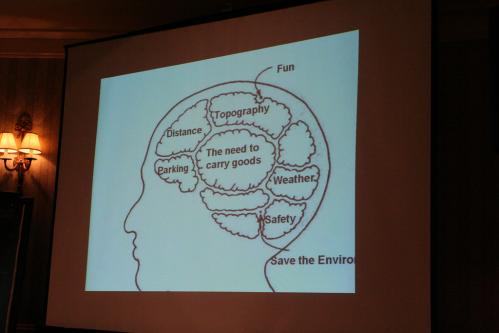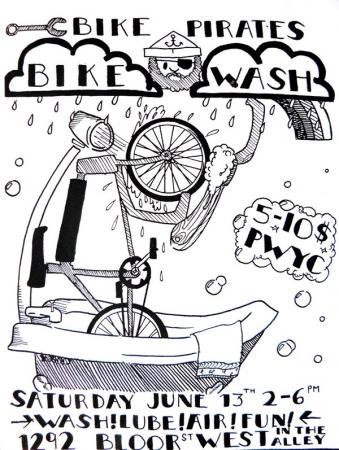
Way back on May 28, Toronto had its Bike Summit. Better late than never. The presentations are now all on the TCAT website. You can also see a few photos on flickr. Instead of an exhaustive review, I'd like to provide a quick montage. There were other interesting speakers and ideas.
The above photo of a cyclists brain is from Keven Krizek's who emphasized the difficulty of getting accurate statistics of the benefits and costs of cycling infrastructure. The bike modal share in North America is just so low that a 100% increase would only bring it up to about 2%. There is no big impact on CO2 emissions or reduction in car use. The one statistic that we can be certain of (confirmed by Northern European experience) is that separated bike facilities increase the perception of bike safety --> which results in increased bicycle use --> which results in safety in numbers.
The big question (as we've learned with the fight for more bike lanes in Toronto) is: How do we convince the 94% majority that the effects are benign and allow better cycling facilities for the 6% that are going to use them? (Exact numbers may differ depending on location.)
[img_assist|nid=3159|title=|desc=|link=node|align=center|width=500|height=333]
This is Councillor Adrian Heaps talking about how City Council agreed last year to $70 million for the bike capital budget for the next few years with a 37-3 vote. It was not a contentious issue at the time despite the rhetoric of a "war on the car" with the current Jarvis Street bike lanes.
Ralph Bueler of Virginia Tech (no photo) explained how Germany is comparable to North America: high car ownership, rich, freeways with no speed limit. The difference is that Germans drive a lot less at all income levels and population density. In the US 70% of all trips are made by car, 1% by bike. In Germany 15% of all trips are by bike. What makes the difference? Individual choice and policy changes. Germany had a cycling boom in the 70s triggered by the oil crisis and enhanced by policy changes at the local planning level and the federal level such as with much higher gas and road taxes.
[img_assist|nid=3163|title=|desc=|link=node|align=center|width=500|height=333]
Pauline Craig touched on bicycle parking in Toronto. There's a draft zoning by-law in Toronto that will include bicycle parking regulations for the first time - both short-term and secure, long-term bike parking (please comment on the zoning website!). The Bicycle Station is the highlight for this year. Also in the photo are Eric Anderson of Berkeley who spoke about bike parking in the US (lots of great on-street bike parking that takes over car spots), and Andrea White-Kjoss spoke on the nitty gritty of the Bikestation, a company that runs bike stations in a number of American cities.
[img_assist|nid=3160|title=|desc=|link=node|align=center|width=500|height=333]
Adolfo Hernandez, from Chicago's Active Transportation Alliance, explained how his organization has worked with African-American and Latino communities to strengthen and bring diversity to the cycling movement. Activists have to work with the local authorities - churches, mosques, community centres - to get people behind active transportation.
[img_assist|nid=3162|title=|desc=|link=node|align=center|width=500|height=333]
Dave Meslin pointed out that active transportation advocates should be more about anti-car rather than trying to put just walking and cycling under one roof. Despite the similarities of moving legs, the goals may diverge. The idea of "road diets" may be helpful for neighbourhoods and pedestrians, but not as helpful for cyclists and transit users who would rather see roads be shared with bike lanes and transit priority lanes. Active transportation advocates should keep to the idea of "Complete Streets" - streets made for all uses: walking, cycling, transit, cars - rather than just reducing roads.
[img_assist|nid=3158|title=|desc=|link=node|align=center|width=500|height=333]
The bike union did valet bike parking. If you want valet parking for your outdoor play, football game or birthday party, let them know - they're really good at it and you should give them money to do it.
[img_assist|nid=3161|title=|desc=|link=node|align=center|width=500|height=375]
The day previous to the Bike Summit the speakers joined City staff Sean Wheldrake and Dan Egan on a tour of various neighbourhoods and cycling infrastructure. The highlights were the Don Trail, Lakeshore Trail, Cabbagetown, Regent Park, St. Lawrence Market and Distillery District. I came along and brought the old Bikeshare bikes to be used by the out of town riders.

